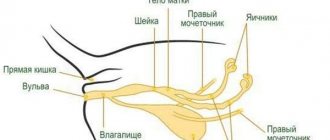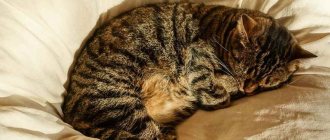If a cat leaves home and does not return, there is serious cause for concern for its fate. But superstitions are no less tormenting, because there are many folk signs associated with the care of these animals. Cats are traditionally considered to be connected with the other world, so their actions have long been seen as having mystical overtones. Succumbing to rationalism, spending all your energy searching for a pet, or unraveling the message of fate is a personal matter for everyone, but in any case, the fact of a missing cat cannot be ignored.
Reasons why cats leave home
Despite the many prevailing superstitions, there are always objective and explainable reasons why cats leave the house:
- A new pet has appeared in the house - a kitten, a puppy. Or a child was born. A cat who considered himself the only and main object of his master's love may simply not cope with feelings of jealousy and resentment.
- The animal experiences frequent stress due to an unfavorable environment in the house or the intrusiveness of children when playing. The child should be taught to treat the pet carefully and affectionately and to normalize the emotional background in the family.
- The cat is lost. This is an active animal, at any age it can get playful, succumb to hunting instincts and, in pursuit of “prey,” simply get lost. Sometimes the pet finds its way home and returns on its own.
- The female went after the cat or the male went after the cat during the spring rutting period. This happens especially often in March-April. Usually within a week or two the animal that has gone on a spree returns. A female - most likely with a future offspring. Also read the article about when cats start walking.
- The cat left to die alone. Even a completely domestic pet, feeling its death approaching, often leaves its owner. People find several explanations for this - the animal wants to hide in a secluded place from pain, and does not want to cause worries in loved ones.
But, most likely, it’s about the same ancient instincts. In any wild pack, a terminally ill individual seeks solitude so as not to attract danger to its relatives, since it can no longer be a strong member of the pack. The behavior of an old or sick pet in this case is similar.
Animal age
Young animals also die. Injuries, illnesses, accidents - all this significantly reduces life expectancy. But the death of older pets is much more common. Most often these are cats and kittens who are 15-17 years old. It happens that home beauties celebrate their 25th anniversary, but this is the exception rather than the rule. Most often, veterinarians guide the owner to the age of 14 years. Each subsequent year can be considered a gift.
And yet, why do cats leave home and not return? Is there some kind of mysticism behind this, or does the explanation lie on the surface, we just don’t want to notice it? Let's look for an explanation for this behavior together. To console the owners, I would like to say that death is the natural end of life. Over the years, the animal will no longer play like a kitten. There is no need to feel guilty, this is just a natural ending. But your task and responsibility is to provide your pet with decent last months, weeks and days of life. Therefore, it is important to know why cats leave home to die, and to prevent this from happening. Alone, he will be deprived of care and the opportunity to get the help he needs.
Why do young animals disappear?
When a young animal disappears, there may be several explanations in addition to the most common reasons:
Lack of life experience
The cat may jump from the balcony while hunting for birds or insects. In this case, he either falls to death, or the wounded man is unable to find his way home, finds himself in an unfamiliar place, and gets lost.
If there is a highway near the house, then a young animal running out of the house can easily end up under the wheels of cars traveling at high speed.
An inexperienced cat can become a victim of a pack of feral dogs. If he does not have time to climb the tree, then most likely he will not be saved.
Longing for the owner
If a beloved owner has died or left for a long time, the cat may simply leave out of grief.
Unfriendly atmosphere in the house
Frequent quarrels, shouting or even fights can easily provoke the departure of a cat, especially a young one. Sometimes cats acutely feel the “dislike” of one of their household members towards them.
Mr. Cat recommends: signs and superstitions
Cats have lived next to humans for many centuries. And mystical abilities have always been attributed to these animals. Even the ancient Egyptians and Buddhist monks believed that cats were guides of souls to the world of the dead, and their death was considered a bereavement.
There are many legends and superstitions about cats, their behavior, and dreams with these animals. There are also some of them that are associated with pets leaving home. They often contradict each other.
Here are some of them:
- The cat anticipates the imminent death of one of the household members and runs away from the supposed trouble. Observations indicate that pets often help the owner’s recovery, constantly lie next to the patient and, “taking away” the disease, go away to die.
- The cat does not run away from imminent death, but takes it with him, averts trouble from his home.
- The pet left to make room for a new tenant. Perhaps a child will be born in the family soon.
- The cat left the house where the seriously ill man was lying, which means he will die soon.
- In Rus', it has long been believed that the cat leaves, taking away all the bad energy from the house, not necessarily foreshadowing the imminent death of someone in the family. And if the cat dies, the owner receives one of its nine lives as a reward for his love. There are known cases when a pet literally threw itself under the wheels of a car, preventing the death of the person it was protecting.
- The cat left because Brownie was angry with the owner and the whole family. The animal understands that it cannot protect them.
- They say that Brownie may not like a black, red or white cat. In this case, no matter which cat is taken into the house, it quickly disappears. They recommend trying to take, for example, a tricolor pet and, when bringing it into the house, ask: “Keeper guardian, master father!” To a rich yard - a furry beast! You take care of him, and I won’t forget you.” And put a treat, for example, milk in a saucer, and put candy next to it.
- There is something “bad” in the house, maybe a magical ritual was performed here. The cat, sensing the presence of evil otherworldly forces, leaves him.
Read about what to do if your cat dies at home and what it could mean.
It is up to the individual to decide whether or not to believe in these superstitions. But, if the owner sincerely loves the pet, he will do everything not to lose him.
How to spot signs of a cat's imminent death in a timely manner
One of the most common reasons for animals leaving home is imminent death. This can happen to both a very small kitten and an adult.
In order to promptly guess about the imminent death of a pet and try to prevent it or alleviate the last months, days and hours, you need to know its signs.
Signs of imminent death of kittens
Sometimes kittens die. Newborns may die in the first hours or gradually fade away over the course of a week. Older kittens fight for life as long as they have enough strength.
Symptoms of early departure may include appearance - oily, unkempt fur, lethargy, refusal to eat.
In such cases, very young children remain close to their mother until the end, but slightly older ones, even at two months, can leave home. The reasons for the non-viability of babies are most often the following:
- oxygen starvation or hypothermia of the newborn has occurred;
- the kitten and mother have incompatible blood types;
- the birth process was extremely difficult;
- the female gave birth for the first time, she did not have enough experience to behave correctly;
- the kitten was born with a developmental defect incompatible with life;
- the baby was born with low weight;
- the female with the litter are in poor conditions, poor nutrition, insufficient care;
- the cat has an infectious or parasitic disease, the entire litter is infected in utero.
We recommend an article about the first birth in cats.
But in many of these cases, kittens can be saved.
Signs of impending death in an adult cat
An adult, middle-aged animal most often leaves to die. Natural instincts take over and the cat leaves its beloved owner. Often, before leaving, the pet does not leave the person’s arms, rubs and caresses, as if saying goodbye.
By the behavior of an elderly pet, you can see that his death is near and prevent him from leaving home. For a loving owner, it is important that in the last days the pet is surrounded by warmth and care.
The main symptoms of the imminent death of a cat:
- Slowing heart rate. In an adult healthy cat it ranges from 140 to 220 beats per minute. As the heart muscle wears out, the contraction frequency decreases.
- Change in breathing. It becomes severe, difficult, and coughing or sneezing may occur. The number of breaths per minute increases (normally 20-30).
- Decreased body temperature. Normally it is 37.5-39.5 degrees Celsius.
- Change in appetite, complete refusal of food and water.
- Digestive problems - often constipation with blood.
- Violation of hygiene habits. The animal is sometimes so weakened that it cannot reach the toilet.
- Appearance. The coat becomes unkempt and unkempt.
- Impaired coordination of movements, orientation in space.
- Almost constant sleep.
- Dilated pupils and a fixed gaze are evidence that the pet is in pain.
- Desire for solitude.
Symptoms of imminent death
Anticipating imminent death, animals change greatly. Of course, it cannot be said that they understand what is happening. But intuitively, animals are looking for an opportunity to spend as much time as possible with their owner. Even weak animals that led a passive lifestyle during life find the strength to play. It's difficult to say why this is happening, but this is one of the signs that he doesn't have much time left.
But this behavior is not always typical. Otherwise, the question of why cats leave home and do not return would not arise. If a cat suffers from cancer or another incurable disease, then its death is sudden. In this case, the condition changes so dramatically that the animal tries to find a secluded dark corner to hide from the pain that is pursuing it.
Symptoms of imminent death are:
- A trail of age-related chronic diseases.
- Apathy and drowsiness. The animal almost never leaves its favorite place.
- The appetite decreases, the cat loses a lot of weight.
- Begins to lose orientation in space, bumps into various objects, and sways when walking.
- Breathing becomes heavy, pupils dilated.
Owner behavior
A loving owner, having noticed in time the signs of the pet’s imminent departure, must make a decision. If the cat is clearly in pain, experiencing pain, or having seizures or convulsions, then it is better to let her go.
Veterinary clinics now have a euthanasia procedure that allows the animal to painlessly endure the moment of death.
An elderly pet should be given increased attention - monitor its pulse, breathing, and take its temperature if necessary. If it is difficult for a cat to get to the toilet, then the tray should be placed next to the house or bed.
At the end of life, chronic diseases usually worsen. Timely treatment can prolong the life of the animal; it is important to contact a veterinarian in time.
If the cat is not in pain and a decision has been made about a natural death, then the owner should focus maximum attention on the pet - spend all his free time with him, surround him with love, affection, and make sure that he does not leave the house.
The cat left home and did not return: what to do
If a day has passed and there is no pet, you should assess the situation. If the cat leaked and ran away, there is no point in looking in the yard. She will “walk” (sometimes she can be absent for up to 7 days) and return calm, tired and with a beastly appetite. The same should be expected from a cat that has gone on a spree. Still, it’s worth inspecting your utility rooms, and also asking your neighbors. A cat may end up locked by accident, or in some situations, on purpose, out of mischief or to catch mice.
If the cat is many years old, something bad happened, he disappeared, you need to start searching. The cat felt bad, and he decided to wait out the pain in a calm, cool and dark place. Cats do not suffer from claustrophobia; on the contrary, they love to hide in confined spaces. This is where you need to look for them. In addition, you need to place an ad about your missing pet.
If there is no animal in the house or outbuildings, you need to look under the threshold, in the basement, in the park. Cats prefer to hide in thickets of bushes or reeds; they can climb into a hole abandoned by wild animals.
When the young cat left, he may have been injured by the dogs, suffered in a fight for a female and hid to lick his wounds. You should also look for it in the same places. If bleeding starts, every minute counts.
Be sure to read:
The cat shows its tongue: physiological and pathological reasons, the opinion of veterinarians
How to prevent escape
To avoid losing your beloved pet, it is enough to take a number of necessary measures:
- If the animal is not intended for breeding, then it must be sterilized or neutered. Now in any veterinary clinic this harmless operation is performed under anesthesia. As a last resort, you can use special drops and tablets that suppress sexual desire. But, as practice shows, they are often ineffective or lead to the development of serious diseases.
- For cats and breed-class cats, special conditions of detention must be provided. The male and female usually mate at least twice a year.
- You should not let your pet go for walks on its own. They are possible only if the family lives in a private house with a high fence with complete protection from the penetration of other animals.
- In the city it is better to walk your pet on a leash. Cats of any breed can easily get used to wearing a harness if you start training from an early age (from three months).
- To prevent your pet from falling out of the window, it is necessary to install special anti-cat protective nets. They protect animals from falls much more reliably.
- There should be a friendly and respectful attitude towards the cat in the house. If she is being starved, there is poison from cockroaches all around, or there is constant screaming and fighting in the house, then she will definitely leave.
- It is necessary to monitor the front door to prevent your pet from escaping in time.
How to find a cat
If the animal still runs away, a search should be organized immediately. If this is a dacha or cottage community, then advertisements posted in places where almost all residents visit - near the store or the office - usually help you find a cat.
In the city, online advertisements on special websites and social networks will help you find a fugitive.
A cat that is allowed to walk outside on its own must be microchipped. Although the best option would be a collar with a tag that shows the owner's phone number and name.
You need to be especially attentive to your pet if there is a forest nearby. The cat's natural instincts will lead him there, and he will easily get lost.
If the pet is already old, then, first of all, you need to inspect all the nooks and crannies in the yard or garden - a sick animal usually does not go far, but looks for a secluded corner. It is important to remember that the cat's safety is in the hands of the owner.
Where do cats go?
Many works describe situations when, on the eve of death, an animal leaves home. There are many theories about the reasons for this phenomenon. Some explain this by saying that cats do not want to cause psychological trauma to their owner. Others suggest that the torment experienced causes the animal to seek a secluded place where it can wait until the pain subsides.
There are cases when old animals climb into the owner’s arms, literally do not leave his side, and then leave the house forever. Let's look at how folk signs explain this phenomenon.
Rituals to bring home a missing cat
A white candle is placed next to the cat's bowl filled with tasty treats and lit. Until it burns out, the owner must sit nearby and mentally turn to the spirits and higher powers with a request for the return of the fugitive, wishing him health, strength and protection.
The owner should place a full glass of water with the words “to my house, to my threshold” at the front door and keep it there until the escaped animal returns.
For the next ritual you will need a ribbon or rope. The legs of the table are tied around the perimeter. It is believed that in this way good news is brought into the house.
Another ritual is as follows. With a lit white candle, they approach an open window or vent and say “Smoke up the mountain, cat home.” At the same time, the name of the pet is called.
If the pet does not return, then it most likely died. No matter how great the owner’s longing for his pet, there is no need to mourn him for a long time and torment the soul of the deceased, it is better to let the cat run along its rainbow.
Self-sacrifice
According to legend, cats can ward off trouble from home. They sacrifice themselves for the sake of their owners, taking misfortune away from home. In such cases, they no longer return and even the most thorough searches do not yield results. Agree, only for such self-sacrifice should you love your cats.
Owning an animal means taking responsibility for its life and activities. To prevent your pet from bothering you and causing mischief, you should definitely devote time to it and find interesting things to do. Then the cat will splash out its energy and let you work!
Main photo: pxhere











